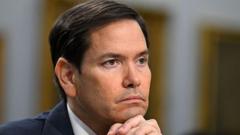As the Trump administration implements stringent visa policies and reduces federal research funding, American scientific leadership faces unprecedented challenges. Many graduates from leading institutions in countries like India are now redirecting their ambitions toward research opportunities in other nations, with only a fraction intending to work in the United States.
U.S. Scientific Landscape at Risk as Visa Policies Shift Under Trump Administration

U.S. Scientific Landscape at Risk as Visa Policies Shift Under Trump Administration
Foreign researchers are increasingly deterred from seeking opportunities in the United States due to restrictive visa policies and funding cuts, threatening the nation's scientific standing.
Amid shifting political tides, the United States finds itself at a precarious juncture in the scientific arena. Prominent figures such as Dr. Raj Ladher from Bangalore, India, have observed a notable decline in American appeals among promising researchers. Historically, the U.S. has been considered a prime destination for many individuals pursuing advanced degrees in the sciences. However, in recent months, this trend seems to have waned significantly.
A recent survey of about 30 graduates by Dr. Ladher revealed that only one was certain of securing employment in the U.S., with many choosing alternative locations such as Austria, Japan, and Australia, or opting to remain in India. This behavioral shift signals a growing concern among academic circles regarding the fate of American science under current political policies spearheaded by the Trump administration.
Assaults on research funding and stricter visa regulations have led to fears among American scientists about their future collaboration with international peers. Notably, David W. Hogg, a New York University professor, voiced apprehension about the implications of these developments, suggesting that it could render vital research activities unfeasible if non-U.S. scientists are unable to engage in collaborative projects.
The acceleration of research cuts and the effort to diminish the foreign student population signal a critical juncture for the U.S. scientific community. Observers warn that unless there is a significant policy shift, the country risks losing its dominance and innovation in various scientific disciplines, which could have long-lasting implications for global research and development.






















